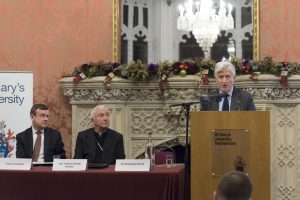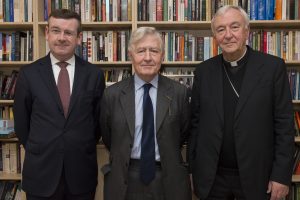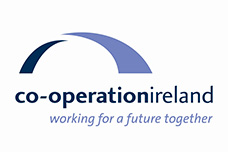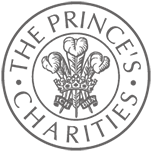
(L-R) Francis Campbell, Cardinal Vincent Nichols, and Dr Christopher Moran, Chairman of Co-operation Ireland at St. Mary’s as Dr. Moran delivers keynote speech on faith & conflict
Remarks by Dr Christopher Moran, Chairman of Co-operation Ireland at St. Mary’s University:
Your Eminence, Vice Chancellor, distinguished professors, ladies and gentlemen, it is a huge privilege for me to be amongst you today to address what is one of the most important and topical discussions in a world riven by division, uncertainty and conflict.
Firstly, I am minded to say that as Chairman of Co-operation Ireland I am above all else a practitioner of peace building.
My work and that of my organisation is very much at the coal face of relationships whether in the Shantallow in Derry or the Shankill Road in Belfast; whether under the watchful gaze of the Carson statue at Stormont or sitting in the splendour of Leinster House in Dublin.
Indeed, as an organisation we have brought together the Heads of State, Her Majesty, The Queen and the Presidents of Ireland to cement Anglo-Irish relationships in the most symbolic and meaningful of ways.
Since taking the helm at Co-operation Ireland I have been a firm believer in the role of facilitation, of gentle nudging, of patient encouragement, of grassroots engagement and of symbolic gestures loaded with nuance. We don’t bang drums or use megaphone diplomacy, we create safe space for dialogue, exchange and learning.
We enable individuals to build the capacity within and across communities. We are laying the foundations for future generations by empowering this generation.
We start with people because we believe as Gandhi once said our greatness has not so much to do with the remaking of the environment and times we live in “as much as being able to remake ourselves.” And all change starts with the individual.
The spectrum of peace building has no specific formulae of success -it merely requires a commitment to work from the top to the bottom and vice versa, to build trust, confidence and belief amongst the players and the protagonists, that there is always a better way than conflict and violence and that this pathway is lit by providing positive leadership at every level in society.
As the title of my talk here today states peace building is not a destination but a journey. Emerging from a society riven by division, burdened by history and separated by conflicting narratives requires persistence, perseverance and patience- a lot of patience.
I noticed that this was a recurring theme that Pope Francis mentioned recently when visiting Azerbaijan.
Addressing the Grand Mufti of the Caucasus’s he said- “Now is an urgent moment to engage in the patient process of reconciliation.” The fact that Pope Francis recognised the urgency for action when it comes to reconciliation is critical to conflict resolution- the longer the time taken tends to result in much introspection, naval gazing and the picking over old wounds, it rarely results in healing. That he also saw the need for patience once a reconciliation process is triggered, shows a real understanding of the tortuously slow nature of peace building.
The Northern Ireland peace process has taken nearly twenty-five years to ferment into the Northern Ireland psyche.
Its twenty-two years since the first ceasefires and yet legacy issues still haunt the process. WB Yeats wrote that ‘peace comes dropping slow’ but nowhere is it more painfully slow than on the streets and community interfaces of Belfast, Derry or Portadown.
His Holiness also said something which I believe is quite relevant to us today as leaders of civic society and particularly on our topic of conflict and faith and it was “For its part, society must always overcome the temptation to take advantage of religious factions; religions must never be instrumentalised, nor can they lend support to, or approve of conflicts and disagreements.”
I believe this to be particularly important for us to recognise what the Pope is saying here- that society should not try to scape-goat religious differences for political purposes and nor should religious leaders allow it either.
The media, often in a rush to meet deadlines will sometimes create sensationalist headlines. Simplistic interpretations to complex matters. Give misleading headlines and present readers with a sub-text that sectarianism is at the base of everything whether true or not.
Of course, the easy answer is to blame the Churches or religion for the differences and disagreements that result in violence but to believe that would be naive and foolish. After all, at the heart of the Irish question has always been a constitutional and territorial issue.
When I reflect on Ireland – the narratives of identity and religion have reinforced one another for such a long time that they have become confused and conflicting with the actual history and the political progress we have witnessed.
Throughout Irish history national identity and faith have become interchangeable, interwoven and sometimes inseparable.
Even today the people of Northern Ireland remain separated not only by culture but also through segregated education, housing and politics and indeed the use or misuse of religious symbolism.
Indeed, it’s hard to believe sometimes that the great Christian tradition of Ireland was once so outward looking that it populated Europe with seats of great learning from Bangor to Bobbio and from Derry to St Gallen.
Today and notwithstanding the overall climate of peace in Northern Ireland, there are 48 – 8 metre walls running for miles within Belfast still separating Christians from one another.
However, these walls are only a symptom of a greater barrier – that in the minds of the residents who live under their shadow. Mistrust and fear still pervade these communities and they are a focus of Co-operation Ireland and we are trying with others to open shared spaces like parks, community centres and campuses to break down decades of hatred and division.
It’s not easy work I assure you but there are signs of hope emerging and as recently as this year some Belfast residents on both sides of the divide in interface areas have agreed to the opening of security gates allowing both access to some play parks – a small but significant step for both communities.
Sectarianism and fear run deep in Northern Ireland and there is considerable historical fact to base it on. In the 19th Century, the Great Liberator, Daniel O’Connell who did so much to redress the inequities of the Penal Laws believed that Irish nationalism and Catholicism were one and the same. The Rev Henry Cooke in Belfast who believed that only Reformed Protestants could save Ireland from being ruled from Rome met him with equal gusto and invective.
Ironically as the eminent American sociologist Dr NJ Demerath pointed out– “it is possible to identify with a religious heritage or tradition with little or no spiritual input!”
Dr Demerath talks about cultural religious identity as having negative impacts amongst communities in conflict. Symbols and images may form a barrier or divisions between communities.
There’s no doubt that communities in times of tension and fear used religious differences to reinforce pre-existing prejudices or jaundiced views of the other side.
The Ulster playwright, Martin Lynch recently wrote a play about the workers strike of the 1930’s when for the first time catholic and Protestants marched together for better working conditions.
Such was the level of segregation says Lynch that the only song that both sides knew that wasn’t sectarian was the 1920’s Broadway hit – ‘Yes – we have no bananas.’
Low church attendances in Northern Ireland give witness to the fact that the attachment is more cultural and less spiritual and prove that people have adopted religion as part of their ethnicity and politics rather than any form of religiosity.
All of which is deeply unfair to the Churches in Northern Ireland, which have shown great leadership during some of the worst moments of the Troubles.
Indeed, Churches often provided the one safe place for people to meet together.
In preparing for this speech it came to mind just how many people of faith played such an important role in the very successful peace building process, which now has so many fathers. No one should underestimate the impact of the huge moral leadership demonstrated by successive Primates of Ireland – both Catholic and Protestant but there was also the silent witness of many clergy who ministered to victims and their families immaterial of religion or cause.
Of course, the peace narrative in Northern Ireland could not have emerged had it not been for the work of clerics like the Redemptorists Fathers Reid and Reynolds; the former Methodist Moderators, Dr Jim Rea and Harold Good or the leadership given by Presbyterian leaders like John Dunlop and Ken Newell.
Christian inspired places for free expression and ecumenism like Corrymeela or the Renewal centre in Rostrevor stood out like beacons when Northern Ireland was suffering its darkest of days.
These men got their hands dirty in this peace process. They had no arms, no weapons and indeed no mandate but their integrity, their honesty and their commitment to delivering a fair and just process, which respected the dignity of all.
During my stewardship of Co-operation Ireland I have come to learn the value of communication in peace building.
My experience as a public servant and businessman is that sometimes listening is more important than speaking and when communities are in conflict, it is important to understand the dynamics at play and to be able, as far as possible, to put yourself into the shoes of all parties involved.
Politics in Northern Ireland always seemed to me to have been anchored in what is known as a zero-sum game. It seemed as if it was better that everyone had nothing rather than each could have something.
But eventually people and politicians following the lead given by the communities in NI came to understand the benefits of what the former Russian President Mikhail Gorbachev called ‘compromise based on a balance of interests rather than a balance of power’.
As a front-line organisation involved in peace building we recognise conflict, such as that in Northern Ireland, is multi-faceted and therefore any resolution must be multi-layered. To that end we have worked at both ends of the spectrum. At a grass roots level, we operate several programmes.
Most of our programmes are particularly aimed at young people as it is they who will shape the future but they are also more open to new experiences and carry less baggage in terms of history. It’s hard to believe but those children born when the first ceasefires took place in 1994 have now voted in at least three elections.
As Chairman of Co-operation Ireland, I understand more than others, the need to remain positive during the most difficult of circumstances and sometimes with the most difficult of people.
I also understand how we must develop leadership within communities at a grass roots level as well as nurturing and reinforcing positive political leadership where and when we can.
It’s on this latter point that I would like to take a moment to talk about some of the big picture events that Co-operation Ireland have been behind.
We have always believed that leadership is a top down and bottom up process, yet in some ways politics in Northern Ireland can often be more about representing communities than leading them.
As Chairman of Co-operation Ireland I hosted the first private meeting between Her Majesty, The Queen and President McAleese as far back as 2005 at my home Crosby Hall.
Since then there have been many seminal and historic moments with memorable reciprocal State visits and symbolic handshakes, which have brought solace and reconciliation.
Not least amongst these was the historic handshake between Martin McGuinness and HM The Queen at the Lyric Theatre, Belfast.
No one on these shores underestimated the significance of that event especially after the Queen’s landmark state visit to Ireland. I think its important to point out that many of these acts are symbolic but their trickle-down effect amongst communities is equally significant because it changes perceptions by providing images that people never imagined could happen.
If I may, I do think its worth paying tribute to Her Majesty, the Queen who set the tone for the backdrop to current Anglo-Irish relationships when she said “With benefit of historical hindsight we can all see things which we wish had been done differently or not done at all.”
Your Eminence, Vice Chancellor I sincerely believe that those few words will resonate for generations amongst, Unionists, nationalists, English and Irish alike. They were what some like to call a ‘game changer.’
And the culmination of each of those seminal events involving the Queen culminated in her attendance a few weeks ago at Crosby Hall for a major Anglo-Irish event at which she unveiled her portrait commissioned by Co-operation Ireland to mark her 90th birthday and her role as Joint Patron. Vice Chancellor, you were also present. Perhaps the most remarkable aspect of that event was its cross community and cross political nature from right across these islands. Thanks to a dedicated decade of diplomacy by myself and others it is now normal for the Irish Government and Sinn Fein to be present at such events as a matter of course.
The Prime Minister Theresa May would also have been present at the event but was unable to attend due to a trade visit to India. The Prime Minster did however send me a letter in which she stated with Brexit in mind.
“Co-operation Ireland has played a key role in fostering the relationship between the UK and Ireland as well as promoting reconciliation on the island of Ireland and building a stronger, shared society within Northern Ireland. You promote, manage and implement a whole range of imaginative programmes that bring together young people from all parts of the community with the aim of building a more peaceful, stable and prosperous Northern Ireland for everyone.
It is fitting that your event this evening is held in the presence of Her Majesty the Queen and HRH The Duke of Edinburgh. As everybody agrees Her Majesty’s historic visit to Ireland in 2011 and the return visit by President Higgins in 2014 were ground breaking events. They helped to take UK-Irish relations to new levels and of course Co-Operation Ireland was involved in both of them.
There is no doubt that relations between our two countries are at their best since Irish independence nearly a century ago. We are bound together by ties of history, family, business, trade, culture and identity. This year has also shown how sensitive anniversaries and events that once had the potential to divide us can be handled in ways that are inclusive, respectful and are designed to promote shared understanding. I am determined that as the United Kingdom forges a new role in the world the bonds that unite our two countries are both strengthened and deepened.”
This all shows the warmth of the relationships that now exist and which bode very well for the future.
Co-operation Ireland has worked with many of the key individuals in both governments and the NI Executive in delivering impact programmes and we have worked alongside cultural organisations such as the GAA and the Orange Order in getting both parties to participate in and understand the perspectives of each other.
It wasn’t without some trepidation that many on these islands were concerned as to whether the fragility of the peace process would be tested by some significant centenaries such as the signing of the Covenant, the Home Rule Bill, the creation of the Irish and Ulster Volunteers, the Battle of the Somme and the Easter Rising.
Each in their own way was a potential cultural and political landmine- yet each passed with decorum and dignity and with a remarkable amount of deference and respect shown to each side. Maybe Cardinal Newman was right that each of us should “Learn to do thy part and leave the rest to Heaven.”
Peace building also requires practical steps, small steps which are not always as initially significant or media worthy as they look. Only a year ago, I under the auspices of Co-operation Ireland and in conjunction with Tourism Ireland and the City of London, invited every local government authority, North and South to London to partake in the prestigious Lord Mayors show and go to Number 10 Downing Street.
In 2017 the City of London will return to Dublin to help cement those ties whilst on the Lord Mayors world tour.
Whilst no-one could have foreseen the results of Brexit and while Ireland – North and South are likely to be the worst affected, Co-operation Ireland has now established roots which post Brexit may be useful to Belfast, Dublin and London.
Going back to the title of my address- peace building is not a destination- it is a journey; its obvious to many that Northern Ireland has still some unresolved issues. Not least amongst these are the legacy issues for victims, issues around justice and issues around Truth. Neither Co-operation Ireland nor I can be prescriptive about where this will take the peace process.
There are no off the shelf solutions that can be produced, there is no silver bullet or magic dust that will make these issues disappear.
However, Professor Pumla Gobodo Madikizela, who served on the South African Truth Commission, offered a suggestion or an interpretation that has resonance with my own position –which is wholly personal- “Forgiveness does not over look the deed. It rises above it.”
For many this will be impossible but Professor Madikizela has participated in a process, which for her and many South Africans has worked.
Perhaps our greatest contribution to future generations is to come up with a solution- not the same as the Truth Commission but one tailor made for the specific circumstances of our chequered history. It will not be easy but victims and their families deserve a better outcome than the piecemeal approach being taken now.
Finally, Your Eminence, Vice Chancellor, I was minded of an Irish street couplet that once rang out ‘to hell with the future and long live the past. May God in his mercy look down on Belfast.’
I am sure that Belfast has reversed that couplet and that it is now very much focused on the future as a fast-growing city, which is regenerated both in business and tourism terms.
I am also assured that Belfast and its people are more certain of their future – a future built together.
But peace building is not easy. Each day brings forward new challenges and threats. I know too from my involvement as a Vice President of the GB Council of Christians and Jews that bridging differences, creating space for understanding and facing down prejudice is never ending work.
But I take hope from my predecessor, a man who once owned Crosby Hall, Sir Thomas More, who said “You wouldn’t abandon ship in a storm just because you could not control the winds.”
And so too will Co-operation Ireland and I stay on board for the storms and the calmer seas – as I know each person here involved in peace building will too.
Thank you.






